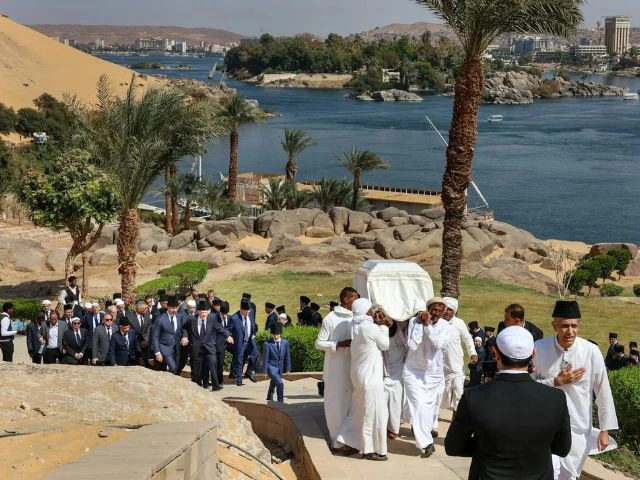Why was Aga Khan IV laid to rest in Egypt’s Aswan?
With the burial of Aga Khan IV in Aswan, Egypt now holds the mausoleums of two Ismaili spiritual leaders.

Prince Karim Aga Khan IV, the 49th hereditary Imam of the Ismaili Muslims, was laid to rest in Aswan, Egypt, on Sunday during a private ceremony.
His death, which was announced on February 4, 2025, at the age of 88, has left the global Ismaili Muslim community in mourning. He was laid to rest in Aswan in accordance with his last wish.
Early life and legacy of Prince Karim Aga Khan IV
Prince Karim Aga Khan IV was born in Geneva, Switzerland, to Prince Aly Khan and Joan Yarde-Buller. His early years were spent in Nairobi, Kenya, before he attended the prestigious Institut Le Rosey in Switzerland.
At the age of 20, he inherited the title of Aga Khan following the passing of his grandfather, Aga Khan III, a transition that bypassed his father, Prince Aly Khan, and his uncle, Prince Sadruddin Aga Khan, who were in direct line to succession.
After becoming Imam, he went on to graduate from Harvard University in 1959 with a Bachelor of Arts degree in History. Throughout his life, Prince Karim held multiple nationalities, including British, French, Swiss, Portuguese, and honorary Canadian citizenship.
Over the course of his life, Prince Karim founded the Aga Khan Development Network (AKDN), an organization he established over 50 years ago to promote humanitarian development across multiple sectors.
His leadership has earned him numerous accolades, including distinctions of honor from France, Portugal, Kenya, Canada, the United Kingdom, Iran, India, Pakistan, and Senegal. He was the recipient of 44 international awards, among them the UN Champion for Global Change Award, and 24 honorary degrees from renowned institutions like Cambridge, Harvard, and McGill.
Why the Aga Khan chose Egypt as his resting place
In a deeply personal decision, the Aga Khan IV requested to be buried in Egypt, near his grandfather, Sultan Muhammad Shah, the 48th Imam of the Ismaili Muslims, and his grandmother, Om Habiba.
The burial site, in the southern province of Aswan, was chosen due to its historical significance for the Aga Khan family. Sultan Muhammad Shah, a pivotal figure in Ismaili history, passed away in 1957, and his presence near the sacred Nile River has long been revered.
The decision to honor his family’s Egyptian roots reflects the Aga Khan's deep connection to the land that has played a central role in shaping his family's spiritual and cultural identity.
Private funeral service and global tributes
The funeral service held in Lisbon on Saturday, February 9, 2025, was attended by international dignitaries, including Canadian Prime Minister Justin Trudeau, Spain’s King Emeritus Juan Carlos, and Portugal’s President Marcelo Rebelo de Sousa.
The Ismaili community in Lisbon joined in paying tribute to the late Aga Khan, marking his passing with profound reverence.
A procession to honor the Imam followed the ceremony, with his body being transported draped in a white shroud through Lisbon. It was then flown to Egypt, where it was met by his family at the Aswan airport on Saturday, before the final journey to his burial site.
Mourners carried the body to the banks of the Nile, where it was placed aboard a yacht that sailed the river in a symbolic farewell to his spiritual journey.
The Aga Khan IV’s lifelong contributions
The Aga Khan IV’s leadership was marked by a seamless blending of spiritual guidance and philanthropic impact. As a descendant of the Prophet Muhammad, he was regarded not only as the religious leader of the Ismaili Muslims but also as a visionary philanthropist and bridge-builder between the Islamic world and the West.
His contributions through the Aga Khan Development Network (AKDN) spanned healthcare, education, rural development, and poverty alleviation, benefiting millions across more than 30 countries.
The Aga Khan's efforts to strengthen the cultural and social fabric of Muslim communities while also fostering understanding with the wider world were unparalleled. His strategic leadership and deep sense of responsibility to his community were instrumental in raising the profile of Ismaili Muslims and their role in both the spiritual and global arenas.
The Aga Khan’s connection to Egypt
The choice of Aswan for Aga Khan IV’s final resting place holds great significance. It pays homage to the Fatimid dynasty, from which the Ismaili Imams trace their lineage.
The Fatimids ruled North Africa in the 10th century and later moved their capital to Cairo in 969 CE. Under their rule, Egypt flourished as a beacon of knowledge, commerce, and religious diversity.
The Fatimids’ cultural contributions have had a lasting influence, with Al-Azhar University — founded by the dynasty — remaining a premier institution for Islamic scholarship.
The Aga Khan IV, acknowledging this heritage, was also instrumental in revitalizing historic Cairo. Through the Al-Azhar Park project, he transformed a 30-hectare mound of rubble into a lush public green space, providing both recreation and a symbol of Cairo’s urban renewal.
With the burial of Aga Khan IV in Aswan, Egypt now holds the mausoleums of two Ismaili spiritual leaders.
Aga Khan III's mausoleum in Aswan
The Aga Khan Mausoleum, located just 2.5 miles from the Aswan Train Station, is a place of deep historical significance. Built by Muhammad Shah, the Aga Khan III — the 48th Imam of the Ismaili community.
Aga Khan III, who suffered from rheumatism and bone pain, first visited Aswan in 1954 in search of relief from his ailments. After experiencing a miraculous recovery due to the region’s therapeutic sands, he chose to make Aswan his winter home.
The mausoleum, built from pink granite, is designed in a style reminiscent of the Fatimid tombs of Cairo. Located near the Monastery of St. Simeon on the West Bank of Aswan, it offers panoramic views of the Nile and the surrounding area.
Aga Khan III was reburied in this mausoleum on February 20, 1959, two years after his death and initial burial in Switzerland. His wife, Begum Om Habibeh Aga Khan, continued to honor his memory by visiting the shrine, and after her passing in 2000, she was laid to rest beside him.
The Aga Khan Mausoleum has since become a pilgrimage site for Ismaili followers worldwide, symbolizing the enduring bond between the Ismaili community and Egypt.
Aga Khan V named as successor
Following the passing of the Aga Khan IV, his son, Rahim Al-Hussaini, has been named the new Aga Khan V, in accordance with his father’s will. At 53, Rahim steps into the role of spiritual leader for the global Ismaili Muslim community, continuing the legacy of his father’s efforts to inspire and lead millions of followers worldwide.
The transition to Aga Khan V represents both continuity and change. Rahim’s leadership comes at a time when the Ismaili community, guided by his father’s vision, is poised to continue its path of social progress and religious devotion.
The Aga Khan's burial in Egypt stands as a lasting tribute to his family's long and storied connection to the region.
The decision to rest beside his grandfather and grandmother—figures of immense importance to the Ismaili community—cements the spiritual and historical roots that the Aga Khan IV sought to preserve throughout his life.























COMMENTS
Comments are moderated and generally will be posted if they are on-topic and not abusive.
For more information, please see our Comments FAQ